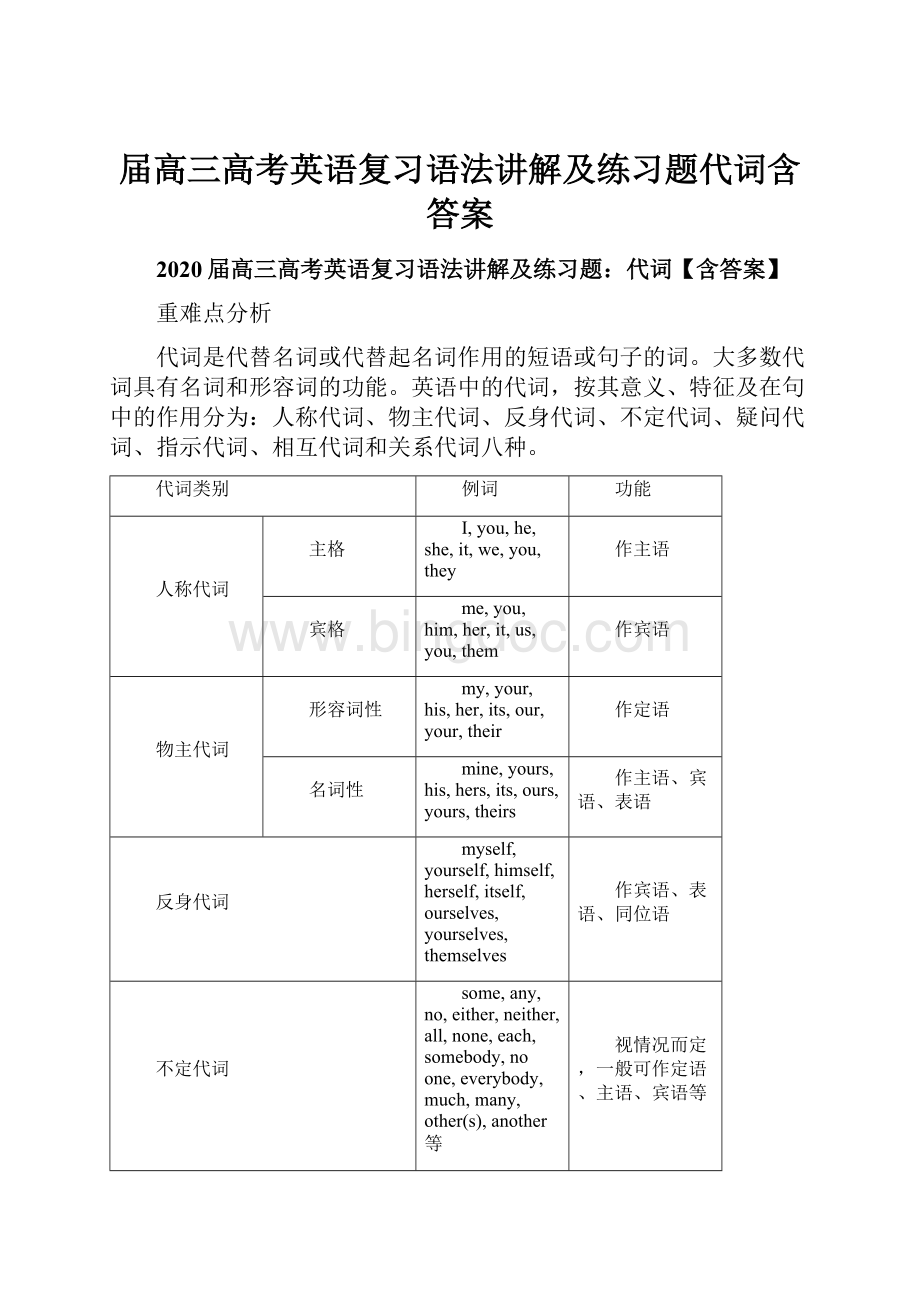届高三高考英语复习语法讲解及练习题代词含答案Word格式.docx
《届高三高考英语复习语法讲解及练习题代词含答案Word格式.docx》由会员分享,可在线阅读,更多相关《届高三高考英语复习语法讲解及练习题代词含答案Word格式.docx(13页珍藏版)》请在冰点文库上搜索。

作宾语、表语、同位语
不定代词
some,any,no,either,neither,all,none,each,somebody,noone,everybody,much,many,other(s),another等
视情况而定,一般可作定语、主语、宾语等
疑问代词
what,who,whose,whom,which,whatever,whichever,whoever,whomever等
可作主语、宾语、定语等
指示代词
this,that,these,those
作主语、宾语、定语、表语
相互代词
eachother,oneanother
关系代词
that,who,whom,whose,which等
连接定语从句
下面举例说明其用法,其中疑问代词见“专题12句子种类”,关系代词见“专题13定语从句”。
一、人称代词的用法
1.作主语用主格,作宾语用宾格。
如:
SheteachesusEnglish.她教我们英语。
2.在句中作表语,常用宾格,但有时用主格。
—Whoisit?
谁呀?
—It’sme.是我。
ItwasIwhotoldhimaboutit.是我告诉他这件事的。
(强调句型)
3.it的用法
用法说明
例句
1
作人称代词,指代前面提到的事物
Thisisnotmybook.Itismary’s.这不是我的书,是玛莉的。
2
替代指示代词this或that
—What’sthis?
这是什么?
—It’sadictionary.这是一本字典。
—Whosejacketisthat?
那是谁的夹克?
—Itishers.是她的。
3
指人
—Whoisknockingatthedoor?
谁在敲门?
—It’sme.是我。
Thebabynomorecriedassoonasitsawitsmother.那个婴儿一看到他(她)的妈妈就不哭了。
4
指时间、距离、天气、环境等
—What’sthetimenow?
现在几点钟?
—It’stenpasteight.8:
10。
It’sgettingcolderandcoldernow.现在变得越来越冷了。
It’sabouttenminutes’walkfrommyhometotheschool.从我家到学校步行大约要十分钟。
Itisveryquietatthemoment.目前很安静。
5
指代前面整个句子的内容
Ourteamwonthefootballmatch.Haveyouheardaboutit?
我们队赢得了足球赛。
你听说了吗?
6
表示“喜欢、恨”等心理方面的动词,后面跟it后再跟从句,其从句作it的同位语
Iwillappreciateitifyoucangivemeahand.如果你能帮我一个忙,我将十分感激。
Ihateitwhenpeopletalkwiththeirmouthsfull.我不喜欢人们满嘴是食物的时候说话。
Ilikeitinautumnwhentheweatherisclearandbright.我喜欢秋天,那时候的天气晴朗。
7
(未指明但谈话双方心里都明白的)那件事、那种情况
Howisit(=yourlife/yourwork)going?
情况怎样?
—Doyoulikeithere?
你喜欢这里吗?
—Oh,yes.Theair,theweather,thewayoflife.Everythingissonice.哦,当然。
这里的空气、天气、生活方式——一切都是这么的美好。
8
It还可用作形式主语、形式宾语以代替主语从句、宾语从句、不定式短语、动名词短语等
It’simpossibletogetthereintime.及时到达那儿是不可能的。
Ifinditstrangethatshedoesn’twanttogo.我发现她不想去,真奇怪。
二、物主代词的用法
1.形容词性物主代词——作定语
Thisisourclassroom.这是我们的教室。
Hisfatherisanengineer.他父亲是位工程师。
2.名词性物主代词
所作成分
主语
Thisishercoat.Mineisoverthere.这是她的上衣,我的在那边。
宾语
Somethinghasgonewrongwithmybike.MayIuseyours?
我的自行车出了点毛病,我能用你的吗?
表语
Thisbookisn’tmine;
itsTom’s.这本书不是我的,是汤姆的。
注意:
(1)英语中必须有形容词性物主代词,而汉语中往往省略不译。
Jacktookoffhiscoatandwenttobed.杰克脱掉外套就上床睡觉了。
(2)“of+名词性物主代词”可用作定语。
Somefriendsofminewillattendmybirthdayparty.我的一些朋友将出席我的生日聚会。
三、反身代词的用法
动宾
TomtaughthimselfChinese.汤姆自学汉语。
介宾
Shelovesmeformyself,notformymoney.她喜欢的是我,不是我的钱。
Sheisnotquiteherselftoday.她今天有些不舒服。
同位语
Imyselfcanrepairthebike.我自己会修自行车。
Thetableitselfhasonlythreelegs.这张桌子本身只有三条腿。
四、指示代词的用法
1.时空的差别。
Thereisthisseathere,nearme,orthereisthatoneinthefourthrow.Whichwillyouhave,thisorthat?
靠近我的这个座位,还是第四排的那个座位,你选哪一个,这个还是那个?
2.this和that在行文叙述上的差别。
Ishallsaythistoyou:
heisapoorman.我要跟你说的是,他是一个可怜的人。
Hewasill.That’swhyhedidn’tcome.他生病了,那就是没来的原因。
3.that和those用于表比较的结构。
TheweatherofZhangjiangisbetterthanthatofmyhometown.湛江的天气比我家乡的好。
TVsetsmadeinNanjingarebetterthanthosemadehere.南京生产的电视机比在这里生产的电视机好。
4.打电话时this表示我,that表示你。
五、不定代词的用法
可数
one,each,many,both,another,either,neither,(a)few
不可数
much,(a)little
可数/不可数
none,any,other,all,some
复合不定代词
anyone,anybody,anything,someone,somebody,something,everyone,everybody,everything,noone,nobody,nothing
1.none,noone与nothing的用法区别
(1)none既可指人,也可指物,且一定是特定概念,常用来回答howmany/much引导的疑问句;
noone只能指人,且只能是泛指概念,常用来回答who引导的疑问句;
nothing“什么也没有”,否定一切,常用来回答what引导的疑问句。
—Howmanypeoplearethereintheroomnow?
现在房间里有多少人?
—None.一个人都没有。
—Whoisintheroom?
谁在房间里?
—Noone/Nobody.没有人。
—What’sinyourschoolbag?
你书包有啥呢?
—Nothing.啥都没有。
(2)none后面可加of引导的介词短语,而something/anything/everything/nothing/someone/anyone/everyone/noone却不能。
Itisnoneofmybusiness!
这不关我事。
2.each与every的用法区别
(1)each强调“个体”,具有代词和形容词的作用;
every强调“全体”,只能作定语。
each作同位语时,不影响谓语动词的数。
不可用noteach来表示部分否定,而用notevery表示部分否定。
Theticketseachcosttendollars.这些票每张要10美元。
(each作同位语)
(2)every还可表示“每……的、每……中的”,下列说法中只能用every:
everyyearortwo每一两年
everynowandthen时常
everyotherday每隔一天
onecartoevery20people每20人乘一辆车
Chooseoneoutofeverytenboys.每10个男孩中选一个。
3.another,other,theother,others与theothers的用法区别
意义
another
再一个,另一个
指同类事物中的另一个,用作代词或形容词。
Idon’tlikethiscoat.Showmeanother,please.
other
另外的
只作定语,常与复数名词或不可数名词连用;
但如果前面有the,this,that,some,any,each,every,no,one以及my,your,his等时,则可与单数名词连用。
anyotherplant,everyotherday
theother
两者中的另一个
常与one连用,构成one…theother…一个……另一个……;
作定语修饰复数名词时,表示“全部其余的”
others
泛指别的人或物
是other的复数形式,泛指别的人或物(但不是全部),不能作定语,构成some…others…一些……另一些……
theothers
特指其余的人或物
是theother的复数形式,特指其余的人或物
4.both,all,either,any,neither与none的用法区别
都
任何
都不
两者
both
either
neither
两者(以上)
all
any
none
IhadtobuyallthesebooksbecauseIdidn’tknowwhichonewasthebest.我不得不把这些书都买下来,因为我不知道哪一本最好。
Itiseasytodotherepair.Allyouneedisahammerandsomenails.做这个修理工作很容易你所需要的是一把锤子和一些钉子。
IinvitedJoeandLindatodinner,butneitherofthemcame.我邀请乔和琳达吃晚饭,但是他们两个一个都没来。
—Whichofthethreewaysshalltaketothevillage?
三条路中哪一条通往那个村子?
—Anywayasyouplease.任何一条都可以。
Wehadthreesetsofthegardentoolsbutweseemedtohavenouseforany.我们有三套园艺工具,但是我们没有怎么使用它们。
5.one,ones,theone,theones,that与those的用法区别
one用来替代前面出现的单数名词,是泛指概念,相当于“a/an+单数名词”;
ones用来替代前面出现的复数名词,有时可用that代替(尤其在有后置定语的情况下);
theones用来替代前面特指的复数名词,有时可用those代替(尤其在有后置定语的情况下);
that用来替代前面出现的特指的单数可数名词或特指的不可数名词,相当于“the+单数/不可数名词”。
Mr.Zhanggavemeaveryvaluablepresent,one(=apresent)thatIhaveneverseen.张先生给了我一件十分珍贵的礼物,这件礼物是我从未见过的。
Mr.Zhanggavememanyvaluablepresents,ones(=manypresents)thatIhaveneverseen.张先生给了我许多珍贵的礼物,它们是我从未见过的。
Thebookonthedeskisbetterthanthat/theoneunderthedesk.桌子上的那本书比桌子下的那本好。
Thebooksonthedeskarebetterthanthose/theonesunderthedesk.桌子上的那些书比桌子下的那些好。
考点练透
一、单句填空用适当的代词填空,使其意思和结构完整。
1.Wecouldn’teatinarestaurantbecause________ofushad________moneyonus.
2.Ihopethereareenoughglassesforeachguesttohave________.
3.Althoughheiswealthy,hespends________onclothes.
4.—CanyoucomeonMondayorTuesday?
—Iamafraid________dayispossible.
5.Ifyouwanttochangeforadoubleroom,youwillhavetopay________15dollars.
6.—ShallIsitatthisendoftheboatortheotherend?
—Ifyoukeepstill,youcansitat________end.
7.Theseplantsarewatered________(每两天).
8.Ifwehadfollowedhisplan,wecouldhavedonethejobbetterwith________moneyand________people.
9.Therearealotoftreeson________sideofthesquare.
10.Youwillnotsee________theanimalsinwinter.
二、完成句子用适当的关系代词或副词填空,使其意思和结构完整。
1.Theweatherwasverysunnythefollowingday,________waswhatwehadexpected.
2.Ihavefinishedreadingallthebooks________areborrowedfromtheschoollibrary.
3.Isthisthesecondtime________youhavebeentoGuangzhou?
4.________isreportedinthenewspaper,thewarbetweenthetwocountrieshascometoastop.
5.Canyouthinkofanotherexample________thisphrasecanbeused?
6.Thetrainon________heistravelingislate.
7.Doyoustillrememberthehappydays________wespenttogetherinBeijing?
8.Ihaveboughtthesameskirt________sheiswearing.
9.Isthisthereason________heislateagain?
10.Herparentswouldn’tlethermarryanyone________familywasverypoor.
11.I,________amyourbestfriend,willhelpyouout.
12.Thedaywillcome________thepeopleallovertheworldwillwinliberation.
13.Thestudentsaretalkingaboutthestrangepeopleandstories________theymetintheadventure.
14.Heistheverymanin________pocketIfoundmylostmoney.
15.Ihaveapicturebyafamouspainter________wassenttomeformybirthday.
三、语篇填空用适当的代词填空。
Oneday,asCarl’swifewasgoingout,herchildbegantocry,beggingtogowith____1____.
“Stayhome,”themothersaidtohim.“When____2____return,wewillkillapigfor____3____dinner!
”
Whenshecameback,____4____foundCarlpreparingtoslaughter(宰杀)apigforthechild’smeal.Shehurriedovertostop____5____.“Whatareyoudoing?
Youarenotreallygoingtokillapig,areyou?
”Iwasjustkiddinghim!
“Howcan____6____lietochildren?
”Carlreplied.“____7____learneachand____8____movementfrom____9____parents.If____10____deceiveyourchildwithlies,youareteachingthechildtolie.Onecannoteducatechildrenthisway.”
Intheend,Carlkilledthepig.
四、语法填空阅读下面短文,在空白处填入一个适当的单词或括号内单词的正确形式。
Asayoungadult,NoahWebsterwasateacher.Atthattime,thecolonies1(fight)forindependencefromBritain.YetthebooksthatAmericanchildrenusedinschoolallcamefromBritain.ThebookswereallaboutBritishpeopleandBritishplaces.Websterwantedbooks2wouldmeanmoretoAmericanchildren’s—agrammarbook,aspellingbook,andareader.Thesebookswereverypopular,andmillionsofthem3(sell).
Websterwasinterestedinchangingthespellingsofwords.4wantedwordstobespelledthewaytheywerepronounced.Forexample,hethought5word“head”shouldbespelled“hed”,andtheword“laugh”shouldbespelled“laf”.PeoplelikedWebster’ssuggestions.Unfortuna